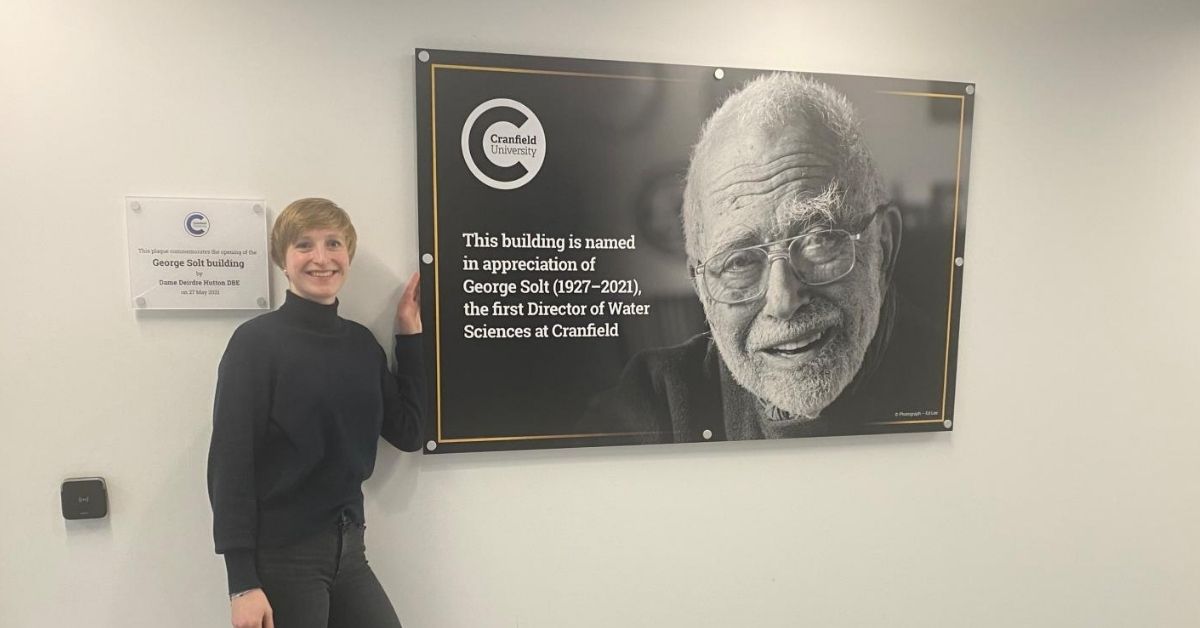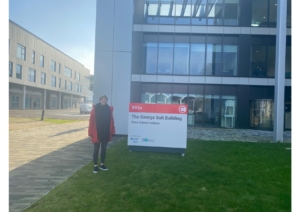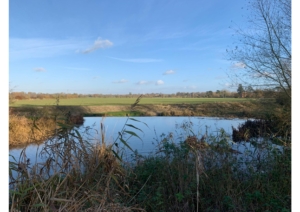My first term on the Advanced Water Management MSc
02/02/2022

I’m Hilke Schweer, an Advanced Water Management MSc student and IWA & Cranfield Excellence scholar from Germany. My interest in water developed gradually over time while studying a BSc in Economics in Hamburg and a BSc in Environmental Sciences in Norwich. What really made this MSc in Cranfield stand out to me was the interdisciplinary research approach to the complex relationships between the economic, environmental, and societal water needs. Having worked in a startup developing a low-cost smart water-quality monitor and in the Agri-tech sector before, the strong interaction between leading research and industry at Cranfield was really promising to me to enhance a holistic approach to this huge topic WATER.
 Already in the first 12 weeks of the course, I have been able to bring together many of my different interests and previous experiences. Every module in the course is very much applied to what you could potentially do in a job later in life. Presentations from external lecturers such as those from the environmental consultancy Mott MacDonald on how the UK water industry is planning to become carbon neutral, and field trips, where staff from the Environment Agency or the local council joined us, made each day very exciting! In addition I have also become a member of the Institute of Water.
Already in the first 12 weeks of the course, I have been able to bring together many of my different interests and previous experiences. Every module in the course is very much applied to what you could potentially do in a job later in life. Presentations from external lecturers such as those from the environmental consultancy Mott MacDonald on how the UK water industry is planning to become carbon neutral, and field trips, where staff from the Environment Agency or the local council joined us, made each day very exciting! In addition I have also become a member of the Institute of Water.
We started the MSc by learning the more technical and physical side such as hydraulics, groundwater, and soil analysis. Then, we went into water quality policy and management of floods and droughts. For example, we wrote a technical report on the impact climate change is predicted to have on the river flow of a catchment, based on a numerical hydrological model that we built. In the second module, we wrote a water quality assessment report and developed a monitoring plan for a river restoration project in England. We used ArcGIS and Excel to analyze chemical and biological data, such as diatoms as indicator species, and put the data into the context of the EU Water Framework Directive. Lectures from the River Restoration Centre and a day-long field trip to the site, where we took measurements and sampled macroinvertebrates, really rounded up the learning in this module.
The IWA & Cranfield Excellence Scholarship lets me become more involved with the International Water Association (IWA). I am very thankful to start my career as a young water professional with this opportunity and hope to connect to many people in the sector looking to find and implement solutions to the world’s growing water crisis.
I have also joined the SAFAD (Silsoe Aid for Appropriate Development) committee as treasurer, a Cranfield-led student non-government organisation linking Cranfield students to projects in middle to low-income countries to get work experience. There, I’ve met passionate people from the Water and Sanitation for Development MSc and already got a high exposure to projects and funding.

In our 14-people class, we are from ten different countries across the world. This diversity and the different study and work backgrounds of everyone adds a lot of value to class discussions. All classes are taught face-to-face and via Zoom. For example, students who couldn’t get their visas on time and anyone who has to self-isolate because of COVID can still join lectures and workshops – minimising the impact of COVID on students and making the experience much more interactive.
The past three months have been intense, but I enjoyed every day of it! I’ve learned an enormous amount of content, and at the same time, I met passionate people from all around the world. Now, I’m looking forward to the next six months where we’ll finish the last two modules on floods and drought risks and water management in cities and catchments, undertake a two-month long group project for a company/organisation, and carry out the individual research thesis.
Categories & Tags:
Leave a comment on this post:
You might also like…
Keren Tuv: My Cranfield experience studying Renewable Energy
Hello, my name is Keren, I am from London, UK, and I am studying Renewable Energy MSc. My journey to discovering Cranfield University began when I first decided to return to academia to pursue ...
3D Metal Manufacturing in space: A look into the future
David Rico Sierra, Research Fellow in Additive Manufacturing, was recently involved in an exciting project to manufacture parts using 3D printers in space. Here he reflects on his time working with Airbus in Toulouse… ...
A Legacy of Courage: From India to Britain, Three Generations Find Their Home
My story begins with my grandfather, who plucked up the courage to travel aboard at the age of 22 and start a new life in the UK. I don’t think he would have thought that ...
Cranfield to JLR: mastering mechatronics for a dream career
My name is Jerin Tom, and in 2023 I graduated from Cranfield with an MSc in Automotive Mechatronics. Originally from India, I've always been fascinated by the world of automobiles. Why Cranfield and the ...
Bringing the vision of advanced air mobility closer to reality
Experts at Cranfield University led by Professor Antonios Tsourdos, Head of the Autonomous and Cyber-Physical Systems Centre, are part of the Air Mobility Ecosystem Consortium (AMEC), which aims to demonstrate the commercial and operational ...
Using grey literature in your research: A short guide
As you research and write your thesis, you might come across, or be looking for, ‘grey literature’. This is quite simply material that is either unpublished, or published but not in a commercial form. Types ...







Such an eye opener to the field “Advanced Water Management.” Life is Water, Water is Life. We have to manage water effectively for sustainability purposes. Thank you Hilke Schweer
Great read!
You are awesome. God bless you.